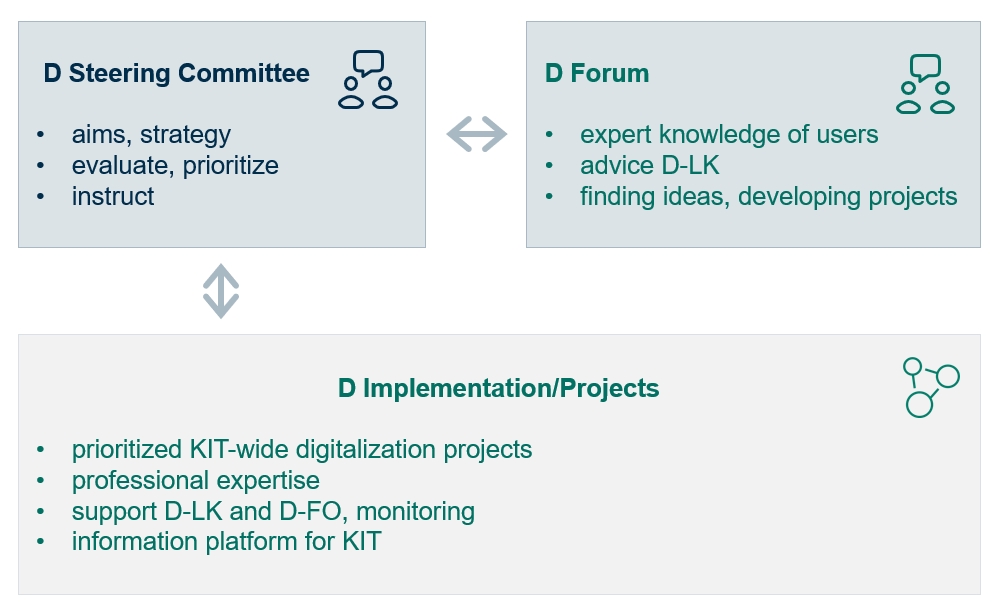Governance

The D-Governance is impact-oriented and effective, which is why it focuses on a small number of functional elements and committees. It promotes implementation projects and strengthens the opportunity for broad participation.
The aim of the D-Governance is to quickly record and discuss impulses, new ideas and challenges relating to digitalization at KIT—with the aim of continuously developing better solutions. The resulting prioritized strategic implementation ideas are coordinated with the existing digitalization strategy and ongoing projects.
KIT's vice president digitalization and sustainability, and CIO Prof. Kora Kristof, is responsible for the D-Governance; the Digital Office (DO) coordinates the implementation of the projects and supports the committees of the D-Governance.
D-Governance committees and their tasks
The new D-Governance comprises two committees, a Digitalization Steering Committee (D-LK) and a Digitalization Forum (D-FO).
Digitalization Steering Committee
The tasks of the Digitalization Steering Committee (D-LK) are of a strategic nature; its members belong to the first and second management levels of KIT or represent the Digitalization Forum. The D-LK discusses the further development of the digitalization strategy, including the associated visions and objectives. It takes opportunities, risks and (new) requirements into account. The D-LK also discusses the necessary prioritization and commissions the implementation. The implementation status and the impact of the projects is reported to the D-LK.
Appointments to the D Steering Committee
The D Steering Committee is made up of the Executive Board, the heads of divisions, the heads of the service units and the head of the DO. The D-LK also includes four representatives of the D-FO. This is to ensure that the perspective of the D-FO is directly and immediately integrated into the D-LK.
Permanent guests are two members of the SCC directorate, the head of the KIT Library (BIB), the head of Data Protection (DSB), the Chief Information Security Officer (ISB), the head of the Center for Media Learning (ZML) and three other representatives of the DO. Further guests are possible depending on the topic. The meeting is chaired by the Vice President Digitalization and Sustainability.
The D Steering Committee meets approximately twice a year.
Digitalization Forum
The second committee is the Digitalization Forum (D-FO). It combines the perspective of the KIT Senate and the views of users and other digitalization experts at KIT, thereby strengthening participation. The D-FO's main tasks are to advise the D-LK, introduce topics and new ideas, discuss them and, if necessary, develop project ideas and provide feedback.
Appointments to the D Forum
The D-FO is made up of four groups.
- four representatives of the D-LK, VP DN, one head of division, one head of a service unit, the head of DO;
- eleven representatives for the status groups of the KIT Senate (Senate members appointed for the task or persons appointed by the Senate) as users or experts on digitization issues;
- ten representatives of the divisions, two representatives of the departments and two representatives of the AStA;
- permanent guests are the same as in the D-LK, supplemented by one representative each from the Staff Council (PR) and Equal Opportunities (CHG). Additional guests are also possible for specific topics.
The VP DN and the head of the DO chair the committee.
Members of the D-FO are appointed for a term of two years or one year in the case of students; mandates may be extended. Appointment and participation are on a voluntary basis.
The D-Forum meets approximately four times a year.
Implementation in projects
Both committees are supported in their roles and responsibilities by the Digitalization Implementation Level/Projects (D-IP). The D-IP organizes the digitalization projects at KIT, including initiation, preparation and implementation. This includes projects for all scientific tasks in research, higher education and transfer as well as for tasks in administration and (IT) infrastructure. The Digital Office (DO) is responsible for coordination and involves other organizational units and people in the projects as required. Data protection, information security and legal issues are also dealt with within the D-IP. In this way, the D-IP efficiently supports the digitalization processes and the committees at KIT via the DO, the other participants and the associated projects.
All strategic digitalization projects at KIT as well as other centrally initiated projects are bundled and made visible in the D-IP. In addition, other decentralized but KIT-wide projects can also be associated in the D-IP.
Selection and funding of projects
The initiation and selection of projects assigned to the D-IP is carried out according to clear criteria based on strategic and factual requirements. A prioritization proposal is drawn up at specialist level, which is discussed in the D-LK if it is strategically relevant and thus prepared for decision-making. The D-LK assesses the strategic relevance of projects and their funding if additional expenditure is required over and above the available resources.
Communication and monitoring
An up-to-date list including a brief description of the D-IP projects is available within the KIT. In addition to this basic information, the projects themselves can actively communicate, e.g. obtain necessary input via surveys or disseminate the results to specific target groups.
For the impact-oriented monitoring of the implementation process and the individual projects, the D-LK and the D-FO receive central information as part of a minimal reporting system. This information serves as the basis for discussions on possible adjustments and further developments.
The digitalization governance presented here replaces the previously valid IV governance framework of KIT by resolution of the Executive Board of May 12, 2025. You can find a detailed set of slides on D-Governance here.

